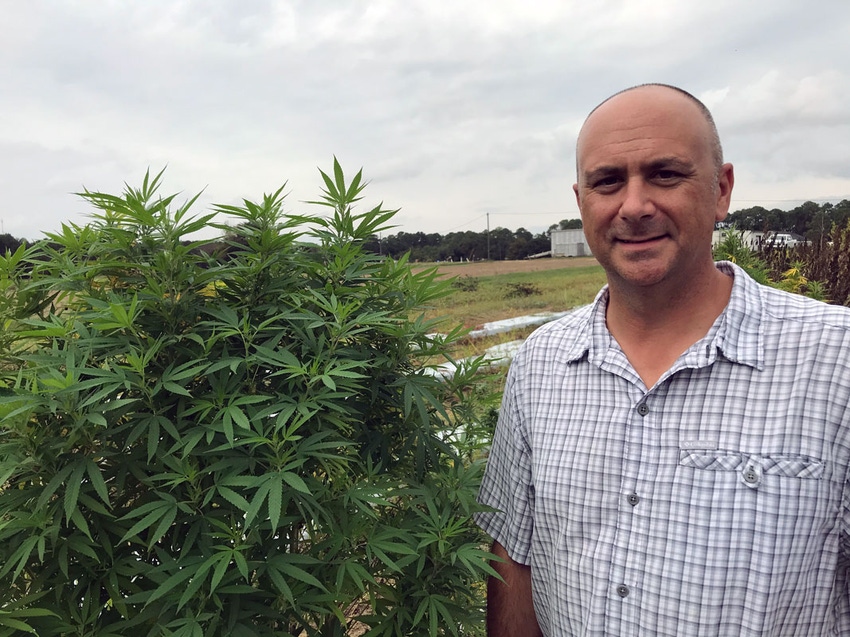
A Georgia hemp production guide will come out later this fall. It won’t be exhaustive. There isn’t enough Georgia-specific hemp data for that, yet, but it will provide information for Georgia growers considering hemp production for floral material, which is meant for the cannabidiol, or CBD, market.
“Although there has been some interest in hemp production for fiber and seed, the majority of growers have expressed an intent to grow floral material,” said Tim Coolong, University of Georgia Extension vegetable horticulturist and now Georgia’s hemp specialist, too, who has done research to compile the guide.
Coolong was the only person who legally grew hemp in Georgia in 2019, which the Georgia Hemp Farming Act allowed him to do for research purposes. His research evaluated about two dozen varieties at three locations: Watkinsville near Athens, Blairsville in north Georgia and Tifton in south Georgia.
“We want to identify the genetics that do well in Georgia and get projected CBD yield information for growers so that they can budget accordingly if they choose to grow this crop, depending upon when they plant, where they grow and so on,” he said.
Many newer hemp varieties have been bred specifically for the CBD market and contain higher levels of CBD and low levels of Tetrahydrocannabinol, the high-causing compound found in marijuana. Still, regular testing for THC during flowering is recommended so that growers can harvest their crop if THC levels begin to approach the legal threshold, Coolong said. The USDA hemp rules focuses an overall vision for how hemp regulations will work in the country, including how the crop will be handled, tested, insured, potentially financed -- or destroyed as needed if THC levels in field rise above legal levels.
Growing Issues
Southern blight, a soilborne disease, became a problem for Coolong’s hemp plots this year, something a little surprising, he said. No synthetic herbicides, fungicides or insecticides are labelled for hemp pests. Weeds, disease and insects, such as budworms that feed on the flower, will challenge Georgia growers.
Coolong said the variable cost to grow an acre of hemp on plastic mulch with drip irrigation for the CBD market will budget out at $9,000 to $10,000, similar to the variable cost to grow an acre of tomato or bell pepper in Georgia.
Growers need to only plant female plants for floral CBD material. Many hemp varieties will flower when exposed to day lengths of less than 14 hours, Coolong said. Georgia has a long growing season, and growers could plant hemp in early spring. If planted when days are less than 14 hours, which happens up until around mid-May in Georgia, hemp may begin to flower before the plants have had a chance to gain good vegetative growth.
Similarly, if growers plant too late in the season, plants will flower too early. In 2019 trials, most common day-length sensitive varieties began flowering during the first week of August when planted in early June. But some planted in mid-July also began to flower at the same time with little vegetative growth.
Though not labor intensive in-season, hemp harvest for floral material is very labor intensive, he said.
A Process
Will Georgia grow more hemp in 2020? Maybe. Getting plants and the licenses to grow them might challenge a grower, depending on when the final stoplight turns green.
The Georgia Department of Agriculture submitted Georgia’s state hemp plan for USDA review July 10. After USDA posted its interim rules Oct. 31, the GDA provided Southeast Farm Press with a statement:
“We are currently reviewing the USDA proposed rule to amend the Georgia plan to comply with the federal rule. USDA expects to approve state plans within 60 days of submittal. Once approved, Georgia will move swiftly to propose a final state rule that complies with U.S. Domestic Hemp Production Program and the Georgia Hemp Farming Act. Following a 30-day comment period, and barring any unforeseen circumstances, Georgia’s rule will be finalized after posting final notice for 20 days with the Georgia Secretary of State,” the GDA statement says.
According to Georgia’s hemp rules now, a grower will have to be associated with a hemp processor before getting a license to grow.
There’s only a small handful of manufacturers and processors of industrial hemp or CBD products currently in Georgia, which are sourcing material outside of the state. But interest is growing, Coolong said, adding a half dozen or more processors may pop up in Georgia in some capacity next year.
Officials with GA Xtracts announced in October they intended to create 250 jobs by the end of 2020 to staff its newly opened hemp processing facility in Watkinsville, not far from where Coolong had a hemp test plot this year. The company’s expansion is supported by a multimillion-dollar investment in capital developments.
“The CBD market in the U.S. is slated to grow to nearly $24 billion by 2023, and we are dedicated to helping Georgia farmers and CBD retailers maintain a competitive position in the industry,” said Don Barden, CEO of GA Xtracts. “We are working closely with the University of Georgia to create quality standards for growing and processing hemp that will sustain long-term success for local farmers. Watkinsville is the ideal location for our facility thanks to its proximity to the university, and its easy access to farming operations throughout the state.”
Under the 2018 Farm Bill, the United States removed industrial hemp from the list of Schedule 1 drugs, further opening the legal door for farmers to produce hemp again in the United States. Many states jumped onboard the hemp wagon even earlier, working under language in the 2014 Farm Bill allowing state-level pilot programs for hemp production and research. Georgia didn’t initiate a pilot program under the 2014 farm bill.
About the Author(s)
You May Also Like






